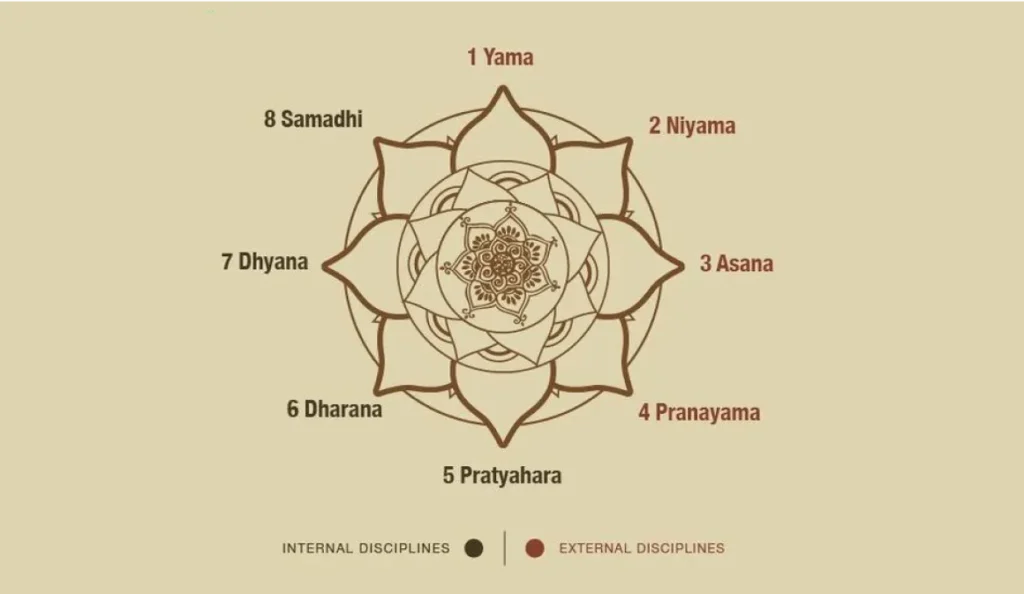In today’s fast-paced and often chaotic world, the ancient teachings of yoga offer profound insights and tools to help us navigate life’s challenges. Yoga philosophy, rooted in texts like the Yoga Sutras of Patanjali and the Bhagavad Gita, provides a framework for understanding ourselves and the world around us. It encourages us to cultivate inner peace, resilience, and harmony. This blog will explore how we can apply these timeless principles to modern-day challenges, helping us create a more balanced and fulfilling life.
Understanding Yoga Philosophy
Before we delve into practical applications, it’s essential to grasp the core concepts of yoga philosophy:
1. The Eight Limbs of Yoga
Patanjali’s Yoga Sutras outline the Eight Limbs of Yoga, which serve as a guide to leading a meaningful life. These include:
– Yama (ethical standards)
– Niyama (self-discipline)
– Asana (physical postures)
– Pranayama (breath control)
– Pratyahara (withdrawal of senses)
– Dharana (concentration)
– Dhyana (meditation)
– Samadhi (state of bliss)
Together, these limbs offer a holistic approach to personal development and self-realization.
2. Key Philosophical Principles
Some key principles from yoga philosophy that can be particularly relevant to modern challenges include:
- Ahimsa (non-violence)
- Satya (truthfulness)
- Asteya (non-stealing)
- Brahmacharya (moderation)
- Aparigraha (non-possessiveness)
Applying Yoga Philosophy to Modern Challenges
1. Navigating Stress and Anxiety with Ahimsa
In a world filled with stressors, practicing ahimsa can be transformative. Begin by cultivating non-violence in your thoughts. When faced with stressful situations, remind yourself to approach challenges with kindness and compassion, both towards yourself and others. This can help mitigate anxiety and create a more peaceful internal environment.
Practice Tip: When stressful thoughts arise, pause and take a few deep breaths. Replace critical or harsh thoughts with affirmations of self-love and understanding.
2. Fostering Authentic Communication with Saty
In a society driven by social media and instant messaging, authentic communication can sometimes take a backseat. Practicing satya encourages us to express our true selves and engage in honest conversations. This builds trust in relationships and fosters deeper connections.
Practice Tip: Commit to being truthful in your communications. Before you speak or write, ask yourself: Is this true? Is it kind? Is it necessary?
3. Cultivating Contentment Amidst Consumerism with Asteya
Modern society often promotes a culture of comparison and desire for more. By embracing asteya, we can learn to appreciate what we have and focus on gratitude rather than longing. This shift in perspective can lead to greater contentment and happiness.
Practice Tip: Keep a gratitude journal where you list three things you are grateful for each day. This simple practice can help you recognize the abundance in your life.
4. Finding Balance and Moderation with Brahmacharya
In the age of excess—whether it’s food, technology, or work—practicing brahmacharya teaches us the importance of moderation. Striving for balance in our activities and consumption can lead to a healthier lifestyle and improved well-being.
Practice Tip: Evaluate your daily habits and identify areas where you may be overindulging. Set boundaries to create a healthier balance, whether it’s limiting screen time or practicing mindful eating.
5. Letting Go of Attachment with Aparigraha
Attachment to outcomes, possessions, or even relationships can lead to suffering. Aparigraha invites us to release our grip on what we cannot control and embrace the present moment. This practice fosters resilience and reduces anxiety about the future.
Practice Tip: When you find yourself clinging to a specific outcome, practice letting go. Visualize releasing your attachment and invite a sense of openness and acceptance into your life.
6. Enhancing Focus and Clarity with Dharana
In an era characterized by constant notifications and distractions, the ability to focus is increasingly challenged. Dharana, or concentration, teaches us to cultivate a single-pointed focus that can enhance productivity and clarity in our daily tasks. By training the mind to concentrate, we can improve our ability to complete tasks effectively and thoughtfully.
Practice Tip: Dedicate a few minutes each day to practice focused attention. Choose an object (like a candle flame) or a mantra and concentrate solely on it. If your mind wanders, gently bring it back to your point of focus. Over time, this practice will strengthen your ability to concentrate in other areas of your life.
7. Embracing Mindfulness and Presence with Dhyana
Dhyana, or meditation, is a powerful tool for cultivating mindfulness and presence. In a world that often pulls our attention in multiple directions, taking time for meditation can help ground us in the present moment. This practice not only reduces stress but also enhances our awareness of thoughts and emotions, allowing us to respond rather than react to life’s challenges.
Practice Tip: Set aside a few minutes daily for meditation. Find a quiet space, close your eyes, and focus on your breath. Whenever your mind wanders, gently guide your focus back to your breath. As you develop this practice, you’ll find it easier to remain present throughout your day.
8. Cultivating a Sense of Community and Connection
The principles of yoga philosophy also emphasize the importance of community and connection (Sangha). In our increasingly isolated world, fostering relationships and support systems can be essential for our mental and emotional well-being. Engaging with others who share similar values can create a nurturing environment where we can grow together.
Practice Tip: Seek out community groups, workshops, or classes that resonate with your interests. Whether it’s a yoga class, a book club, or a volunteer organization, being part of a community can provide support, inspiration, and shared experiences that enrich your life.
9. Embracing Change and Impermanence
Life is a series of changes, and the philosophy of yoga teaches us to embrace impermanence. By understanding that everything is transient, we learn to let go of attachments and face challenges with a more open heart. This perspective can alleviate fear and anxiety associated with change, allowing us to flow with life rather than resist it.
Practice Tip: Reflect on the changes in your life—both big and small. Instead of resisting or fearing them, practice acceptance. Journaling about your thoughts and feelings regarding change can also help you process and embrace these transitions.
10. Integrating Yoga Philosophy into Your Lifestyle
To truly benefit from yoga philosophy, it’s essential to integrate these teachings into your everyday life. This doesn’t require a complete overhaul but rather a willingness to adapt your mindset and habits progressively.
– Daily Reflection: Spend a few minutes each day reflecting on how you embodied yoga principles. Consider what worked well and what you can improve.
– Mindful Living: Approach daily activities—eating, walking, and even cleaning—with mindfulness. Being present in each moment can transform mundane tasks into meaningful experiences.
– Continual Learning: Dive deeper into yoga philosophy through books, online courses, or workshops. The more you learn, the better equipped you’ll be to apply these teachings in your life.
Conclusion
The wisdom of yoga philosophy offers a timeless compass for navigating the complexities of modern life. By applying these ancient principles to our daily challenges, we can cultivate a sense of peace, clarity, and balance. The journey of integrating yoga philosophy into daily life is ongoing, and every small step counts.
As we embrace these teachings, we not only enhance our own well-being but also contribute positively to the world around us. In a society that often prioritizes speed and productivity, yoga philosophy reminds us of the importance of slowing down, tuning in, and living with intention. By doing so, we can transform our lives and the lives of those we touch, creating a ripple effect of positivity and harmony in our communities.
Let this be an invitation to explore and integrate the profound teachings of yoga philosophy into your life. As we cultivate awareness, compassion, and balance, we unlock the potential for a more meaningful and enriched existence.







